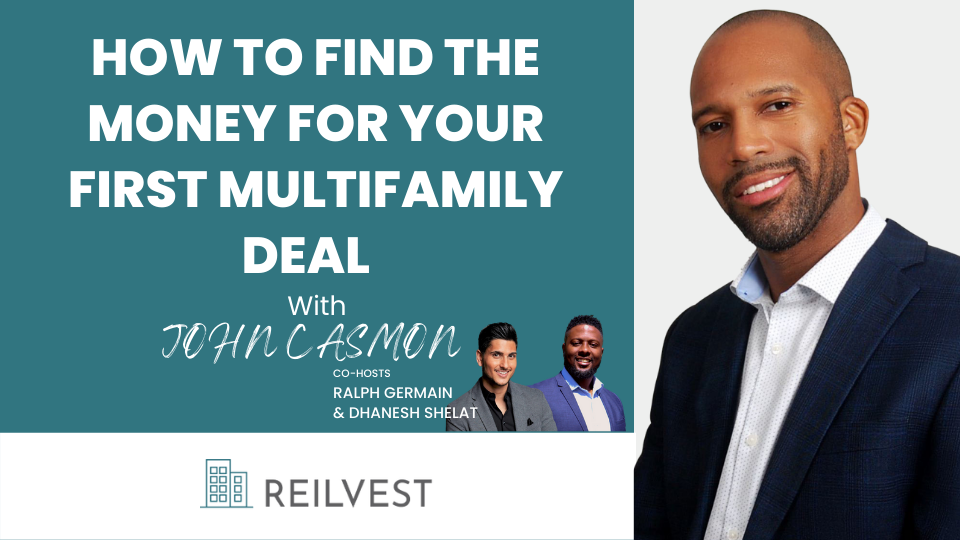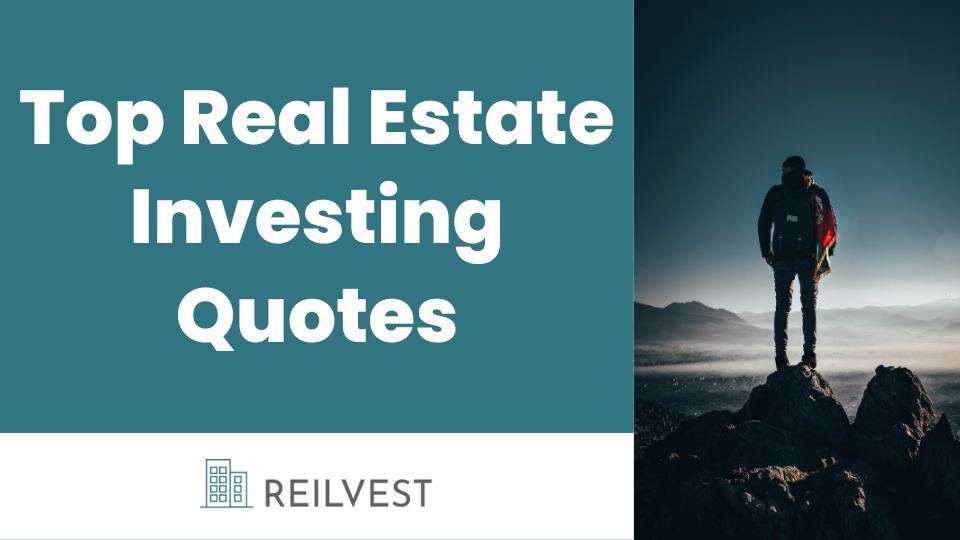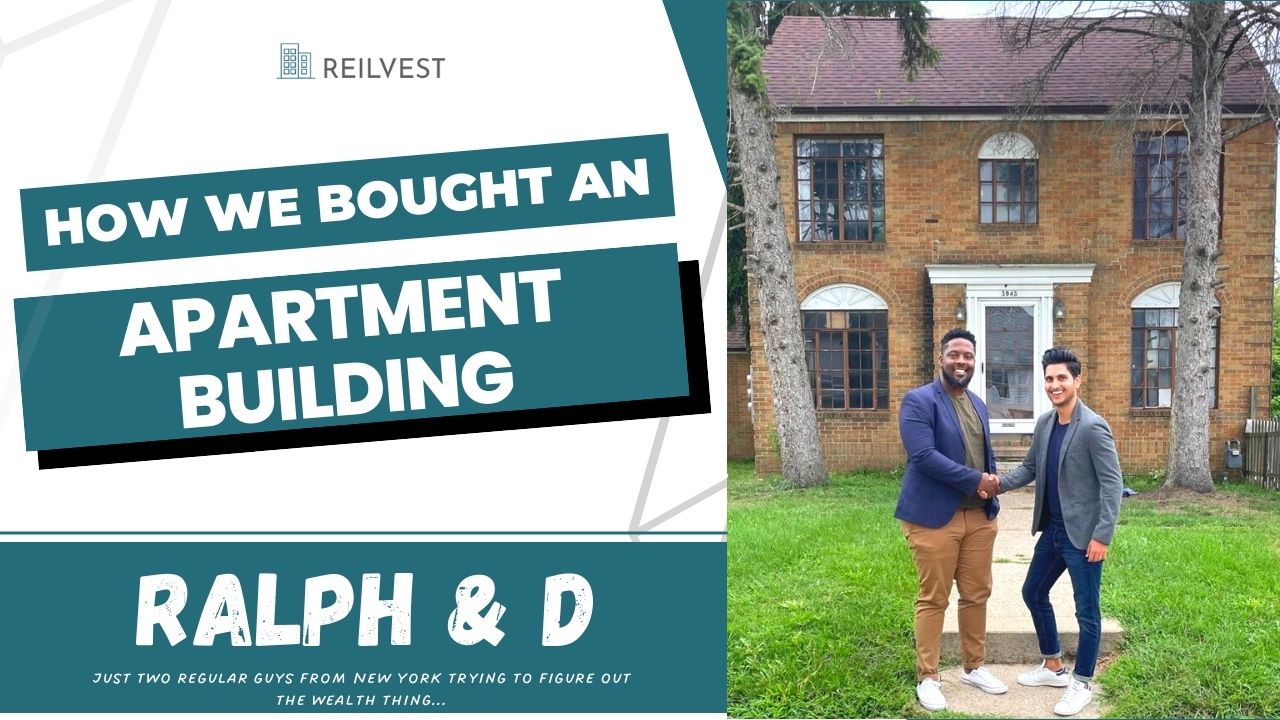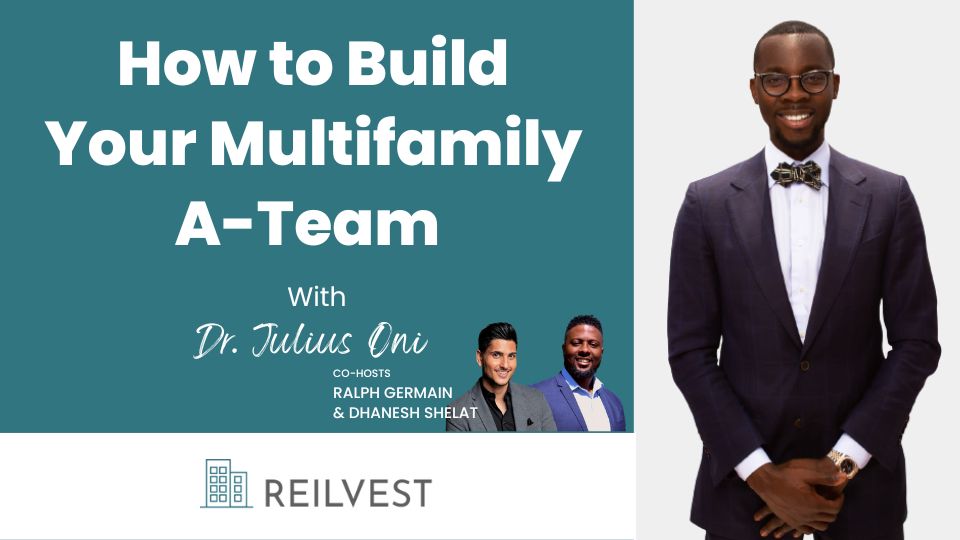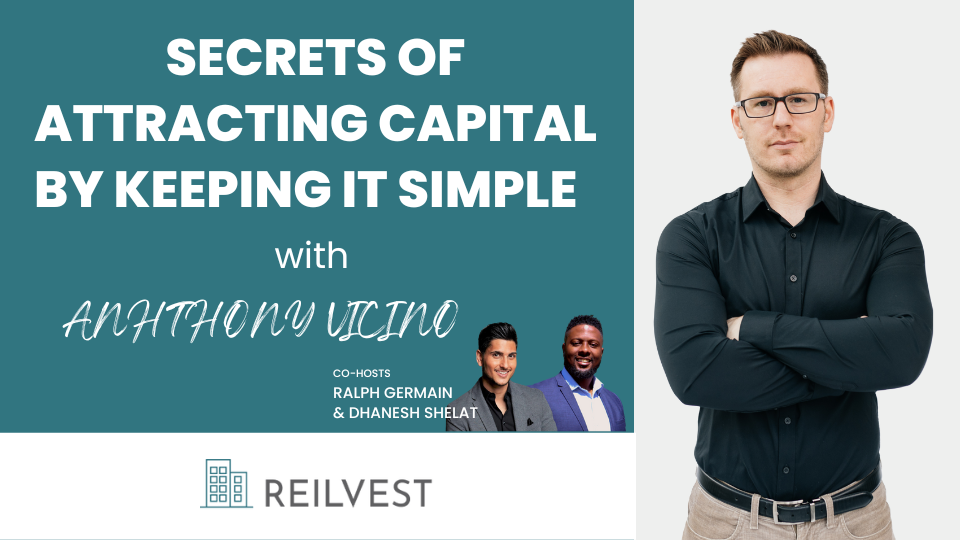John Casmon is a real estate entrepreneur, who has partnered with busy professionals to invest in over $100 million worth of apartments. John also consults active multifamily investors to help them start or grow their business. He hosts the Multifamily Insights podcast (formerly Target Market Insights) and is the co-creator of the Midwest Real Estate Networking Summit. Check out the interview with John:
KEY TAKEAWAYS:
-
- Outside forces can jeopardize your job security so be proactive about building other income streams.
- The 3 C’s to raising capital: Confidence, Credibility, Connections
- Critical to take the time and put in the work to learn about multifamily real estate investing.
- Download John’s Sample Deal
TRANSCRIPT
Dhanesh Shelat:
All right, Ralph. So who do we have today?Ralph Germain:
We’re very excited to have John Casmon on the meetup/show today.John Casmon:
Hey, thank you for having me, man. It’s great to be here. Breakfast club. This is a fun time. So thanks for having me. I see a lot of new faces, Keisha, Darryl, Nicole, it’s great to see you all. And other folks look excited for the Q&A portion, but happy to be here this morning.Ralph Germain:
Yeah. I hope everybody got their breakfast. That’s what we don’t provide, but we are going to provide some great information on multifamily. So John let’s jump right into it. Tell us a little bit about yourself and how you had got into multifamily investing.John Casmon:
Yeah, man. So, I mean, you read a little bit of it on the bio, but my background’s in corporate America and I spent 15 years doing marketing and advertising campaigns for some of the major brands you listed. General Motors, Nike, Coors Light, Mountain Dew, other brands like that. And in short, going back to the early stage of my career, we hit some financial issues. You go back a little more than a decade. We had the financial crisis. I was working in the automotive industry when that took place. I was at headquarters watching my leadership on CNN and Fox News and MSNBC and realized that there was so much anxiety, so much uncertainty, not just with my job, but just within the company as a whole. We ended up going through a structured bankruptcy, but that was really the first time I realized that I could not rely solely on a W2 job.John Casmon:
So that pushed me to look for passive income or other means of making money, being an entrepreneur. But I didn’t really know how to do it. And I remember that book that many of us have read, Rich Dad, Poor Dad. And that really made me think about how I could start investing. The other thing it did though, which is never talked about, or I’ve never heard anybody talk about it. But yes, it can push you into real estate, but it also told you about what you should try to get out of a job or a career. And it talked about focusing on skills. So, for me, that time that I was working in corporate America, doing marketing, I was focusing on building those skills as opposed to just climbing the corporate ladder. So I was able to take those skills and start to invest.John Casmon:
We ended up beginning with a duplex, a house hack that where I lived in one unit, rented out the other unit. And my wife and I, we got married and bought this duplex in Detroit. I’m sorry. In Chicago. We left Detroit, moved to Chicago and then that really got the ball rolling. So from there we saved up some more money, bought a three-unit building. Actually refinanced that first property, had built a lot of equity. We were able to buy an eight-unit commercial building. And at that moment I realized, this is where I needed to go. Unfortunately, life hit me with another little surprise and the advertising agency I was working at, ended up actually going into bankruptcy as well.John Casmon:
So now I’ve been faced with my second bankrupt company in about a what? Eight year, seven year timeframe. And that made me say, “Okay, you had started preparing for this, but the strategy you were using didn’t insulate you completely from the impact here.” And that’s where I said, “You know what? I need to make this a real business. I need to go full-time. I need to put measures in place where I’m working with other people and I’m not limited just by the money I have in my own bank account.” So that was really the last push I needed to make this a real business and go full-time in real estate.Ralph Germain:
Yeah. I love that. A couple of things I just want to highlight, you said here, one is that, similar story, I got laid off from my job and that’s when I realized I needed a shift because I was dependent too much on a job. And the thing that really spoke to me during that time, and I guess you kind of highlighted it as well is like, you can lose your job and it’s not your fault. Right? Because I always thought, “I’m never going to get fired. I would never do anything that’s going to get me fired. So I’m safe. I have a solid career, good company. I’m fine.” But there are forces outside of ourselves that could really compromise our whole financial position really in the blink of an eye. So I wanted to highlight that. And then also the importance of transferable skills, right?Ralph Germain:
Skills that we learn and we apply every day in our careers, they really make us an asset for particular parts of real estate investing. So Dhanesh and I kind of offset our partnership based on the skills that we have that we’re good at. And so I love that as well. And then Rich Dad, Poor Dad seems to be that book that just where this generation just really like changed it. And I always wondered what was it before? And I recently found out about Carleton Sheets and a lot of older real estate investors, that’s the guy, the book. I think he had a video or something, or something that came on at night…that was the Rich Dad, Poor Dad of the previous generation. All right, cool. So what are some ways to raise money for real estate deals? What are some of the best ways and raise money for real estate deals?John Casmon:
Well, I think before you go and raise the money, you have to understand your why. And I’m not going to spend a whole lot of time getting deep into the mental side. But what I mean is why are you looking to raise money and are you actually prepared to raise money? Because I tend to come across two different types of people. Either there’s the person who wants to raise money so I can do these deals, right? “Hey, but I don’t have the money. I need the money to do these deals. How can I raise money?” Or you get the person who doesn’t want to raise money because they’re scared to take on investors and they don’t want that responsibility. Right? So I think first you need to step back. You need to understand what are you actually hoping to do here? And what’s your end game? Because if you just want to raise money to do one deal, what’s your experience?John Casmon:
What’s your track record? Do you have that knowledge? Have you taken the time to build things around yourself to be successful or not? And if you are trying to, if you’re concerned about raising money, it’s actually a good thing. That’s a good fear to have, because that means you recognize the level of importance it has that you need to be careful that you need to really make sure that you’re going to protect those investors and that’s the right mindset. So I actually back it up and we think about it from a standpoint of, there are three Cs that you need to attract capital for deals. The first C is confidence, and the confidence needs to come from preparation. That needs to be about putting in the work. Reading, attending events like this, really educating yourself on the business, the industry, what to look for in the deal, how to structure a deal, how to mitigate risk, how to find contractors.John Casmon:
Take the time and put in the work, read as many books as you can, listen to podcasts, go out there and look at properties and analyze deals and really cut your teeth, and build that confidence so when you see a dealer, you see an opportunity. You actually know what you’re doing and you know how to operate it. The second’s going to be credibility. Now, the credibility comes from both your own experience, as well as the experience of the team you put around. And you talked about, your professional background, you may not have ever purchased an apartment building before. Maybe you never syndicated a deal before, but you have some experience that is transferable. So have you had success in those worlds? For me, I came from corporate America where I was one of the top advertisers and marketers in the country recognized by Black Enterprise Magazine. I helped Buick become one of the fastest-growing brands in America in 2011. Now, that certainly wasn’t all me, but I had experienced managing six agency partners overseeing $100,000,000 advertising budget.John Casmon:
And some of those skills transfer over into apartment investing, right? If I’ve had success there, you can credibly believe that it’s likely that I could have a success buying a million dollar apartment building, right? And managing a property management company. If I manage six agency partners with scopes in the millions of dollars, it’s likely I can manage a property management company. So some of these skills from property management or project management, those are transferable. So what do you have in your background that makes you a credible investor? And how can you highlight that? And then a third C is going to be connections. Okay? You’ve got to have the right people in your network. And I tell people, it’s not just about asking family and friends for money, because that’s going to be very awkward. One, they don’t know… They know you as the person they grew up with or that they go drinking with or watch the games with.John Casmon:
They don’t know you as some savvy real estate investor. So that’s going to be a bit of a disconnect until you can kind of show them what you’re doing and what you’ve learned in this space. The second thing is they just may not be your target. And I think a lot of people make the mistake of talking to people who really aren’t ready to invest with them. So instead, what I would say is you use that network to help you grow your real network. Right? So use your friends and family to connect with people in their network that are the ideal person for you to work with. And we can talk a little bit more about that, but those three CS are going to be confidence, credibility, and connections. And the key here is to make sure you are focused on putting in the work to build that confidence.Ralph Germain:
Yeah. I love that. And I love that. And the confidence, credibility, and connections, and the looking at the sort of skills we already have and trying to apply that here to multifamily investing. So I guess another, some folks might have some experience raising money or partnering with other folks on single-family or residential deals. What would you say is the biggest difference or some of the biggest differences between raising funds for single-family, residential investing versus larger commercial multifamily?John Casmon:
Well, I mean, I think there’s obviously a scale difference, just being bigger. So I think really there are a couple ways to look at that scale difference. One is just the number of units, the number of residents and the moving pieces that you’re going to work through. If it’s over a million dollars, you may be looking at a non-recourse loan versus a recourse loan. Depending on how you partner on a single-family, maybe it’s really…Ralph Germain:
Sorry, can you explain the difference between those two, recourse versus non-recourse?John Casmon:
Sure. Yeah, absolutely. Absolutely. Recourse is when you sign on the loan, you are fully responsible for repaying that loan back, even if the building burns down or disappears, the bank wants… Someone’s paying the bank and it’s you. So either you pay through the property or you’re writing a check to that bank, but you are fully responsible for making sure that loan is repaid. On a non-recourse loan that is not the case. You are not personally obligated to pay that back. The belief there is that the property itself is a business and the business operations will pay it back. And the worst-case scenario, if you lost it, or you weren’t able to pay the mortgage, then they would just take the property back from you and then put it back on the market with other investors. But on a recourse… So residential is all recourse, right? So you know if you don’t pay your mortgage, the bank’s going take your house. So that’s all recourse and some commercial property loans are recourse, but you can also get non-recourse loans on many commercial properties.Ralph Germain:
Yep. Cool.John Casmon:
Okay. But going back to the difference between single-family and multifamily, raising money for single and multifamily, I think you have a couple structural options, right? You can do a loan, you can do a JV really on a single-family, which is what most people do. JV, meaning that, “Hey, you’ve got some money. I can find the dealer to operate the deal. Let’s partner up, we’ll go 50/50, or whatever that split is and we’ll work together.” It can be very loose like that. Sometimes people don’t even have a formal agreement. I would recommend having an agreement in place, but you don’t have to go through a lot.John Casmon:
When you’re raising on these larger multifamily deals, it is very regulated in the sense of you want to make sure that you are formalizing things, you’ve got the right documents in place, you are deciding the structure of how you want to raise. There is something called a Regulation (d), 506(b), 506(c) offering. And essentially what that means is the tax code allows you to solicit funds from private investors using one of these outlets and a 506(b) means you can raise funds from people that, some people call their friends and family, but it’s people that you’ve established a relationship with. And you have an understanding of their means and sophistication to invest with you. 506(c) on the other hand, C as in Charlie, 506(c) is only for accredit investors and accredit investors either have earned an income of $200,000 or more over the last two years, they’re married and filing with the filing income over 300,000, or more over the last two years, or they have a net worth of over a million dollars, not including their personal residence.John Casmon:
There are a couple other things there if you’re in the industry and if you really understand the financial services space, but those are the main qualifications for an individual. So in those instances, you can only raise from accredited investors, but you have the ability to go out there and post on social media. And you can tell people exactly what you do. You can take out a billboard if you wanted to. On the 506(b), there has to be… You cannot solicit. So most attorneys will tell you that you need a preexisting relationship, or at a minimum, you need to demonstrate that you did not solicit funds for these individuals.Ralph Germain:
Cool. Yeah. Excellent. Love it, John. So yeah. Same thing here. I think, when you hear the difference between single-family and go into like commercial, it could feel daunting, it sounds like it’s way more official, the SECs involved in watching and it could be scary. But I think all of that comes down to just knowledge, right? The more you learn and the more education you have, the more it goes back to that first term, right? The more confident you’ll be in terms of working in this space, right? So some people might be comfortable if they’re watching online or watching a replay of this. You might be comfortable in a single-family space and then thinking about that scaling up into commercial can kind of feel overwhelming. But I think the more education, the more you attend and watch things like this, I think the more confidence you build and the more comfortable you begin to be in that space.John Casmon:
Yeah. I didn’t really hit on the importance. Right? I think it’s important to understand the difference, but it’s also important to understand like, “Well, why? Why would you? If it’s so much more complicated, there’s so much more paperwork involved. Why would you do this as opposed to just keep doing your single-family deals?” Well, let’s talk about the way you make money on these deals. On a single-family property, let’s say it’s a rental. What do you make? What? $200 a door maybe on cash flow is what you might make. So you and your friend or whoever else, you got to partner. You come together, you buy this property, you’re splitting, you buy a duplex, you’re going to split $400 a month. All right? So you’re taking home 200 bucks a month. You’re doing all this to make $2,400 a year. How much of your time and energy is that really worth to make $2,400 a year. By the way, that’s assuming we don’t have some big item that takes place, right?John Casmon:
I don’t have a water heater that goes out, or I need to replace the appliances, or I have a vacancy, or I’ve got to redo the entire unit, or I have a water leak, right? That’s assuming none of that stuff happens. And I’m able to pocket this $2,400 a month. On the commercial side of things, you can get paid three different ways. First, you can get an acquisition fee upfront, and most people charge anywhere between the one and 3% acquisition fee. And that fee is of the entire project. So let’s say you’ve got a million dollar deal. You might charge a $20,000 acquisition fee. We’ve already crushed the residential property right by itself. Right? Now, we’re talking about how do you get paid on the actual cash flow? Well, you can either get cash flow distributions, depending on how you structure your deal.John Casmon:
If it’s a JV or 50/50 split, or you can take an asset management fee, which is typically between one and 3% as well. Some people might go up to 5%. But you can take a little fee that you get for managing the asset. So there’s another way that you can profit. And then on the back end, obviously you can sell and get an equity stake, and you can get paid on the back end as well. So unlike residential, where you really have two ways, one of which is really volatile because you only have one or two units. Right? If you’ve got a two unit property, you’re either 0% occupied, 50% occupied, or 100% occupied. When you’ve got a commercial building, got a 100 unit building, you’re probably going to stay anywhere between 85 and maybe 96, 97% occupancy.John Casmon:
So because of that, it’s easier to manage, you have projections, you can expect what you’re going to get in any given month. You can anticipate those things. If you don’t know if you’re going to be zero, 50, or 100 three months from now, well, it’s really hard to project and predict. You kind of just have to have money sitting there. And then when that person moves out, you got to be ready to go. Because you don’t have that leeway. On a commercial building, you’re expecting people to be in and out all the time. And it’s really more about toting that line and making sure you can manage efficiently.Ralph Germain:
Yeah, yeah. Yeah. Excellent. John, can you explain what real estate crowdfunding is? That’s another big buzzword nowadays.John Casmon:
Yeah. Crowdfunding goes back to the regulations. I’m not going to get super technical, but crowdfunding is just really the means of pooling together funds from other investors. The thing that’s a little bit different with crowdfunding is you may not know these investors. So there’s different platforms that exist where you can go on a website. I think RealtyShares is one and there’s some others that are out there, but you can go out there. As an investor, you can put your deal up there. Sorry. As an operator, you can put your deal up there. As an investor, you can sign up, look and see what deals are available, and you can invest. And the thing that’s interesting in appealing to people is a lot of times on syndication deals, there is a minimum investment requirement, and that could be anywhere from 25,000 to $100,000 and sometimes more, but most deals are around $50,000.John Casmon:
So if you don’t have 50 K to invest, maybe you got 10 K, maybe crowdfunding is an option for you. So that’s where it becomes appealing people. The challenge is that you don’t have any direct connection to the operators. You can’t really call them. You can’t ask them follow up questions. There’s no connection at all. You really don’t get a chance to get to know them on a personal level and get a sense of who are they? How do they think? How do they manage through crisis? Who’s on their team? You don’t really get that level of detail. So it really is more of a, “Hey, just take a little bit of money, throw it around. And hopefully it works.” And again, if you’re not in a position to invest in the higher amounts, it’s an option. But I would tell people that you probably have more money to invest than you think.Ralph Germain:
Mm. Yeah. That’s good. Good stuff. So for folks that are just starting out in the private equity space and trying to raise capital, what would you suggest? How would you recommend someone start? If they’re just starting out, trying to figure out how to raise capital, where should they start? What should be the first thing or things that they do?John Casmon:
I’m going to go back to my three Cs, right? You’ve got to really spend a lot of time focusing on these three Cs. So if you’re starting out brand new, never heard about real estate or syndication until this conversation, you need to educate yourself. My podcast is a great place to start. It’s called Multifamily Insights. It’s available anywhere you listen to podcasts. Subscribe, listen to that. There are plenty of other multifamily podcasts as well. Grab some books. There’s some great books on real estate investing and multifamily. The Best Ever Real Estate Syndication Book by Joe Fairless is a great one. There’s a couple of books on raising capital. Hunter Thompson wrote one. My guy, Matt Faircloth wrote a book on it. Check those books out and educate yourself. So outside of the reading and the education and using that to prepare yourself, you really want to surround yourself with people who are in this space.John Casmon:
Again, coming to networking events like this, finding other events that cater towards multifamily investing and raising capital. Those are the places where you want to immerse yourself so you can just be a sponge. Another thing you can do is we’ve got a sample deal on our website and just start to familiarize yourself with the terminology. The way a deal is structured, what to include in a deal, you can check that out at casmoncapital.com/sampledeal. So once you’re going to have that established, now you want to understand how do you build your credibility? You don’t have any experience. So how are you going to go out there and tell people to come invest with me? Right? Well, you’re going to have to leverage the experience of other people. Highlight the experience you do have first and foremost, but then you’re going to need other people. You’re going to need a property manager. You’re going to need a mentor or an advisor.John Casmon:
You’re going to need partners. You’re going to need brokers. You’re going to need lenders. You’re going to need a team of people that you can lean on and say, “Hey, you know what? Here’s what I’m doing. Here are the people I’ve surrounded myself with. And this is why I can move with confidence because my team’s also looking at these deals and they’re going to make sure we find a great opportunity to invest with.” Right? So that’s going to help you. And that goes back to the connections as well, because you’re going to build out your team. But then you’re also going to focus on having these conversations with people and figuring out who can you help? Who is looking for the services that you have to offer? Why would somebody invest? I mean, think about it. The reason people invest are pretty consistent. Either they’re looking for cash flow. They’re looking for the appreciation potential and wealth generating potential of larger apartment buildings.John Casmon:
They’re looking for the tax benefits. So maybe they’re paying a lot in taxes and they’re looking to mitigate some of that to an extent. Or they’re heavily invested in the stock market or one other asset class, and they really just want to diversify. So those are really the four main reasons people are going to invest. And it’s typically a blend of those four, but for some people, it may be more heavily one than the other. I mean, it’s tax time right now as we’re recording this. So right now people are getting a tax bill. And they’re saying, “Man, I’m writing a six figure check to the government. How can I not write a six figure check to the government?” Well, here’s one of the ways. Real estate and commercial real estate in particular has a ton of benefits, as we know. And it’s one of the ways that you can reduce your tax liability.John Casmon:
So understanding all those things together, and that’s a lot. I know it’s I went through a bunch of steps, but first and foremost, educate yourself, build that confidence up. Second, build up your credibility, surround yourself with people who can help support you as you make this journey. And then third, you got to start talking to people, understand what it is that they’re looking for, and how do you convey that? If I can real quick, this really goes back into the transferable skills and the marketing for me.Ralph Germain:
Yep.John Casmon:
Because my background in marketing was the first thing we had to do was understand a consumer. Why would this consumer even want my product? Who am I talking to? If I’m coming in and let’s say, I’m a tea brand. I can’t just start advertising a tea anywhere. I got to understand, well, who drinks tea? Right? That’s the first question is, who is my customer? Who is my client? Who’s drinking tea? So real estate investors don’t tend to do that when they’re looking to raise money. They just start talking to friends and family.Ralph Germain:
Yep. Yep.John Casmon:
But are they investors? Have they ever invested in anything? Do they have the money? If not, that’s not your investor. That’s not your target. That’s not your avatar. But people start there. And that’s why I say you don’t want to start there. The best thing you can do is figure out who your audience is. Another analogy I like to use is to say, if I became a baker and I told you I was opening up my own bakery, I wouldn’t just go to my mom and say, “Hey mom, I opened up a bakery. You want to buy a couple of sheets of sheet cakes from me?”John Casmon:
She’d be like, “What the hell am I going to do with all cake?” So, no. She loves me, right? It’s my mom. Of course she loves me. Of course, she wants to support me in my business. Doesn’t mean she wants to buy two sheet cakes from me. So instead, what we do is I go to my mom. I go to my brother. I go to my uncle, my cousin, my best friends. I say, “Hey guys, you guys know I’ve been baking for a while and maybe you don’t know, but baking is a passion of mine. I’m opening up this bakery and I’m looking to expand my business. Do you know anybody who’s having a wedding, graduation, birthday party or any other gathering? If so, I would love an introduction so I could share with them my bakery skills and maybe get a chance to do business with them.”John Casmon:
The difference was I identified who I’m helping and I talked to my family and friends to help them think about who they can make introductions to. And if you’re raising capital for deals or if you’re trying to grow and raise capital business, then you’re going to have to think about it the same way. You’re going to have to approach people in your network and say, “Hey, here are the kind of people I help. Do you know anybody who fits this bill, and if so, I’d love an introduction?”Ralph Germain:
Yeah. Yeah. And then a lot of times too, that’s when you’ll find the friends and family that want to invest, because they’ll say, “Hey, how about me? I’d be interested.” Without actually asking them directly to invest. But, yeah. Great stuff. One more question here, John. And I think we’ll take a couple from the audience. So if you have any questions for John, you just drop a question in the chat and hopefully we’ll get to all of them, but I guess, in a true essence of sort of like learning from your experience, what have been some of the most difficult challenges you’ve faced with raising funds or maybe some of like the biggest mistakes, if you’d so kindly indulge us. The biggest mistakes you’ve made in terms of raising capital?John Casmon:
The biggest one is really just assuming your friends and family are going to invest with you. Just assuming that they like you and you know they’ve got some funds that they’re going to. It doesn’t work that way. Some people are more risk averse. Some people see you as their little cousin or nephew or their friend, and it’s tough to change and pivot that. So I think you have to just be mindful that anytime you’re launching a business and treat it like a business guys, because if you’re not treating it like a business, then yeah. I completely understand why folks are going to be apprehensive. If you just decide, “Hey man, I’m thinking about this bakery, but I’ve taken no steps to actually launch the bakery. Right? I don’t have a venue. I don’t have any ovens. I don’t even have flour. I’m just telling you, hey, I’m going to launch this bakery.”John Casmon:
Okay. Well, why don’t you get far enough where I can see the vision a little bit more and then maybe I’ll believe it. But if I come to you and say, “Hey, I’m a launching this bakery. Here’s my website. Here are two potential locations where I’m thinking of starting with a truck first. I’m going to be catering these three events and I’m looking to grow and expand.” Whoa, okay. You’ve built that credibility initially, right? Now, when you’re having this conversation, I feel more inclined to help you. But if I don’t believe in you, and it’s not that I don’t believe in you, but if what you’re presenting to me, doesn’t feel packaged up in an incredible way, I’m not going to be inspired to introduce you to somebody who is really planning on this big wedding.John Casmon:
Am I going to introduce you to my best friend who’s getting married and having this big wedding, and I don’t know if you could deliver for her. Probably not. So you’ve got to also convince those individuals in the rung of your circle that they can believe in you, they can trust you, and they don’t need to vouch for you per se, but they have to at least be willing to make that introduction to say, “Hey, you can check out his website or here’s some content he’s put together. I know he bought a couple properties and he’s looking to expand, but you probably want to talk to him.”Ralph Germain:
Yeah. Yeah. Cool. Good, cool. Another question that just came up for me. So some folks here are probably on the call and maybe watching this later will just be starting out in the syndication space. And you’re here, you’re over 100 million dollars invested in apartments. When folks get there at that level, what are some things they should look forward to on how you find investors? So what’s the been the best tools that you’ve utilized to find investors that folks should start to think about at some point getting to that level?John Casmon:
Yeah. You’re going to need to create systems and processes just like any other business. And I’ll go back to the corporate experience, but the person who is running marketing or serum campaigns, customer relationship marketing, those individuals have a specific role. And it all works together within the larger strategy and initiatives of the company. And you really have to think about it from that standpoint. So as you elevate and scale, the business is quite simple. I mean, and there’s a lot of complexity, but every business comes down to selling a widget or a service and being able to produce that widget or service and be able to execute, right? That’s what all businesses are. So in this case, we’re talking about finding properties to invest in. So creating some sort of investment vehicle, being able to raise the capital, or bring on investors for these deals, and then being able to operate and execute all these deals.John Casmon:
So there’s some customer service elements, which is the follow up communications, monthly communications, investor relations. However you want to categorize it. There are things like that need to take place and you need to figure out how do you manage that? What systems and processes can you create? How do you grow your clientele or your customer base? What systems and processes can you utilize to grow that customer base? And then, how do you produce or develop more of that widget? Deal flow and looking at the right deals and getting them under contract, managing them. How do you scale that? So every business really has the same levers.John Casmon:
And in this case, when we’re talking about apartment investing, you got to figure out, okay, well, how do I get more deals? How do we acquire more deals? How do we raise more capital? How do we have more conversations with people? How do we navigate and be more efficient in that process? And then ultimately, how are we more efficient on the backend? Making sure that from a client relations standpoint or investor relations standpoint, those investors feel like they’re heard, they’re taken care of, they’re informed and want to continue doing business with us.Ralph Germain:
Yep. Yeah. Love it, John. Love it. I mean, you’ve just provided such a ton of value for folks today and folks that will probably watch this recording later. So really appreciate it. Thank you so much for just being an open book and sharing so much from your own personal journey and your experience just freely today. Really appreciate that. Last question. What’s the best way for people to get in touch with you? I know folks can invest with you. They could definitely take some consulting, some coaching from you. What are the best ways for folks who are interested to reach out and get in touch with you?John Casmon:
I think the easiest thing is really to get on the sample deal. All of that sample deal, that’ll put you on our newsletter. In our newsletter, you’ll have plenty of ways to reach out and connect, but the sample deal just helps you start starting to wrap your head around what a deal looks like. What questions should you ask? If you’re looking to put together a deal yourself, what kind of things need to be in there? So I would start there casmoncapital.com/sampledeal, and then be sure to check out the podcast as well. Multifamily Insights.Ralph Germain:
Cool. Cool. Awesome. John, thanks so much for your time. Really appreciate it. And good luck to you and everything you’re working on.John Casmon:
All right. Thank you, Ralph.If you’re ready to start your investing journey, we invite you to join the Reilvest Investor Club today!
Disclaimer: The views and opinions expressed in this blog post are provided for informational purposes only, and should not be construed as an offer to buy or sell any securities or to make or consider any investment or course of action.

